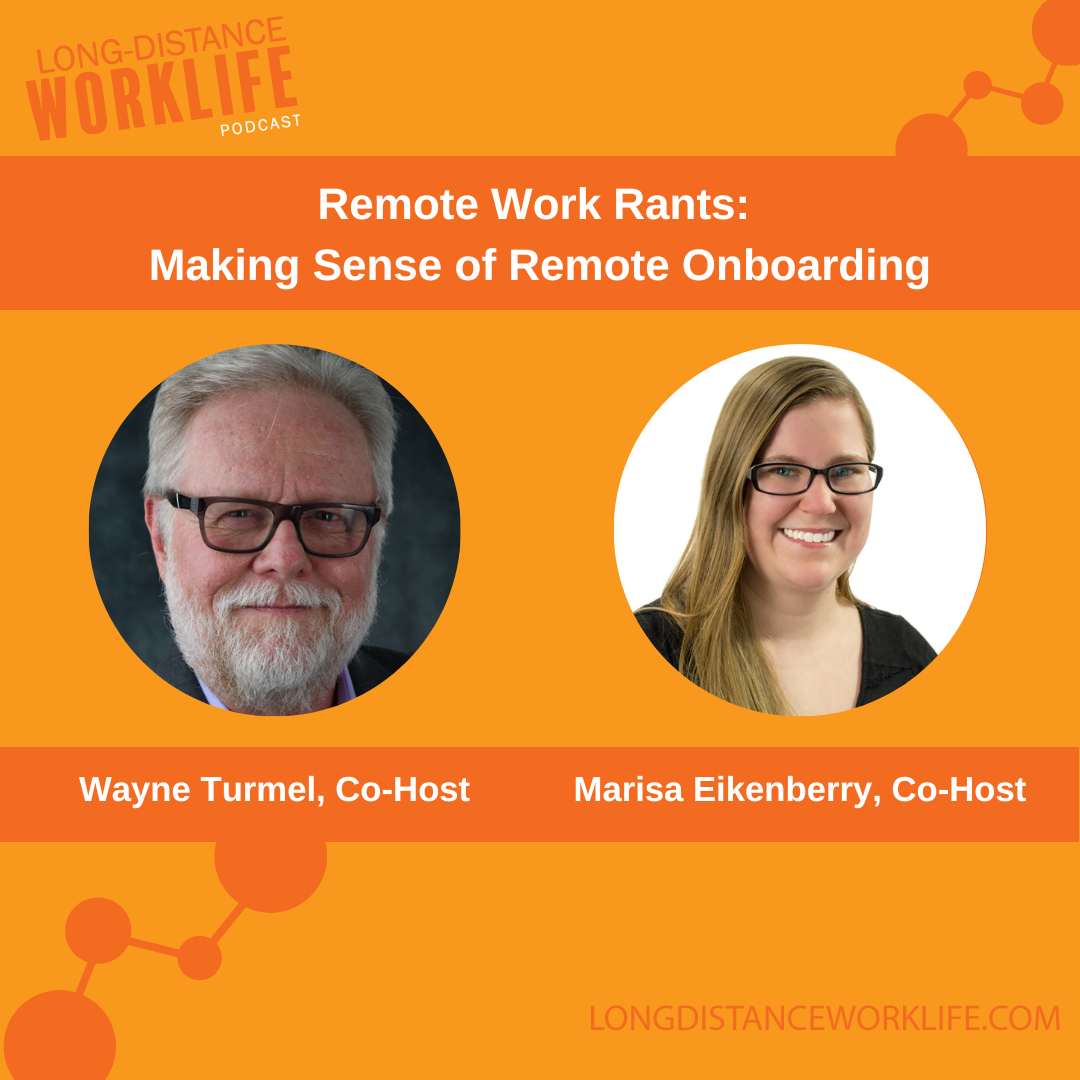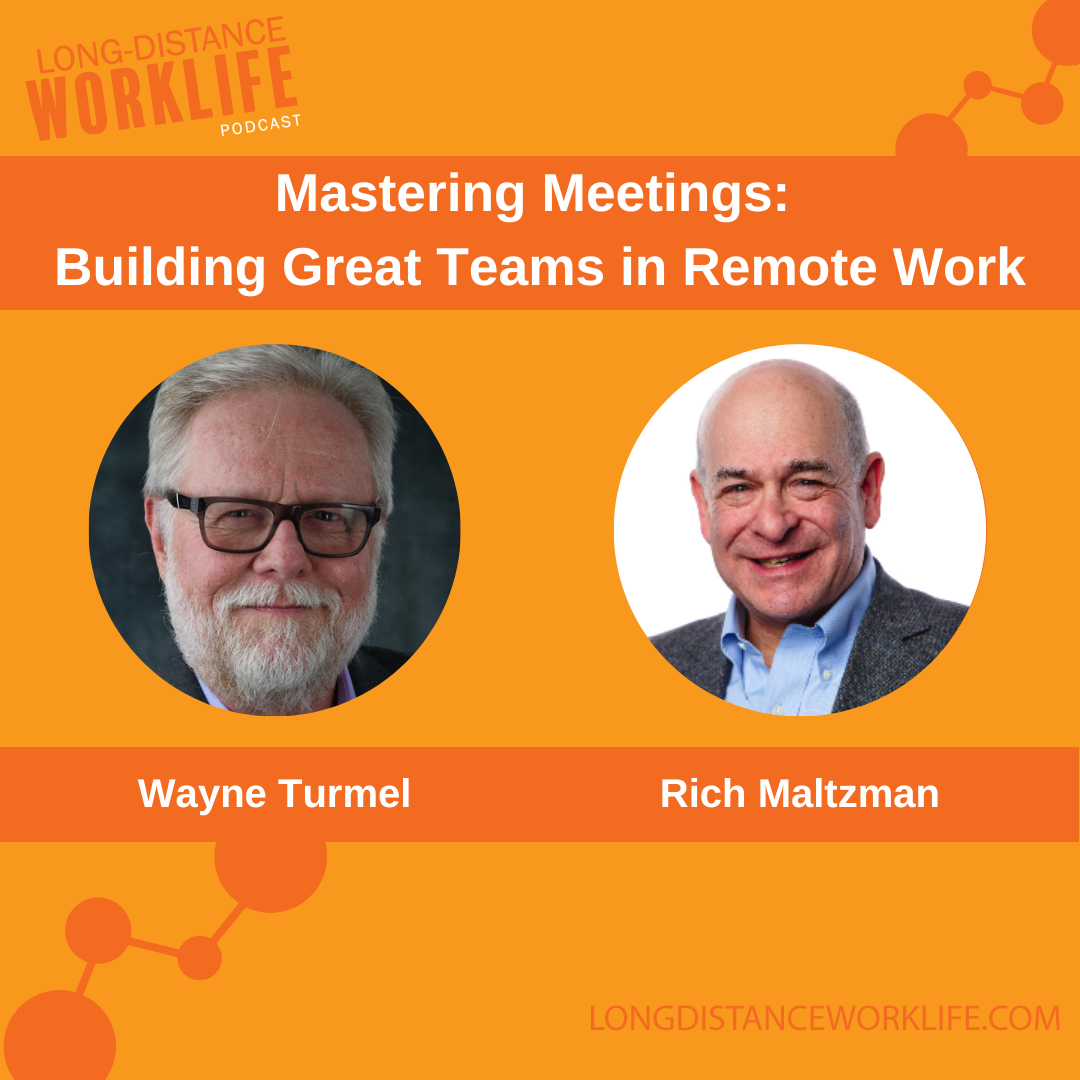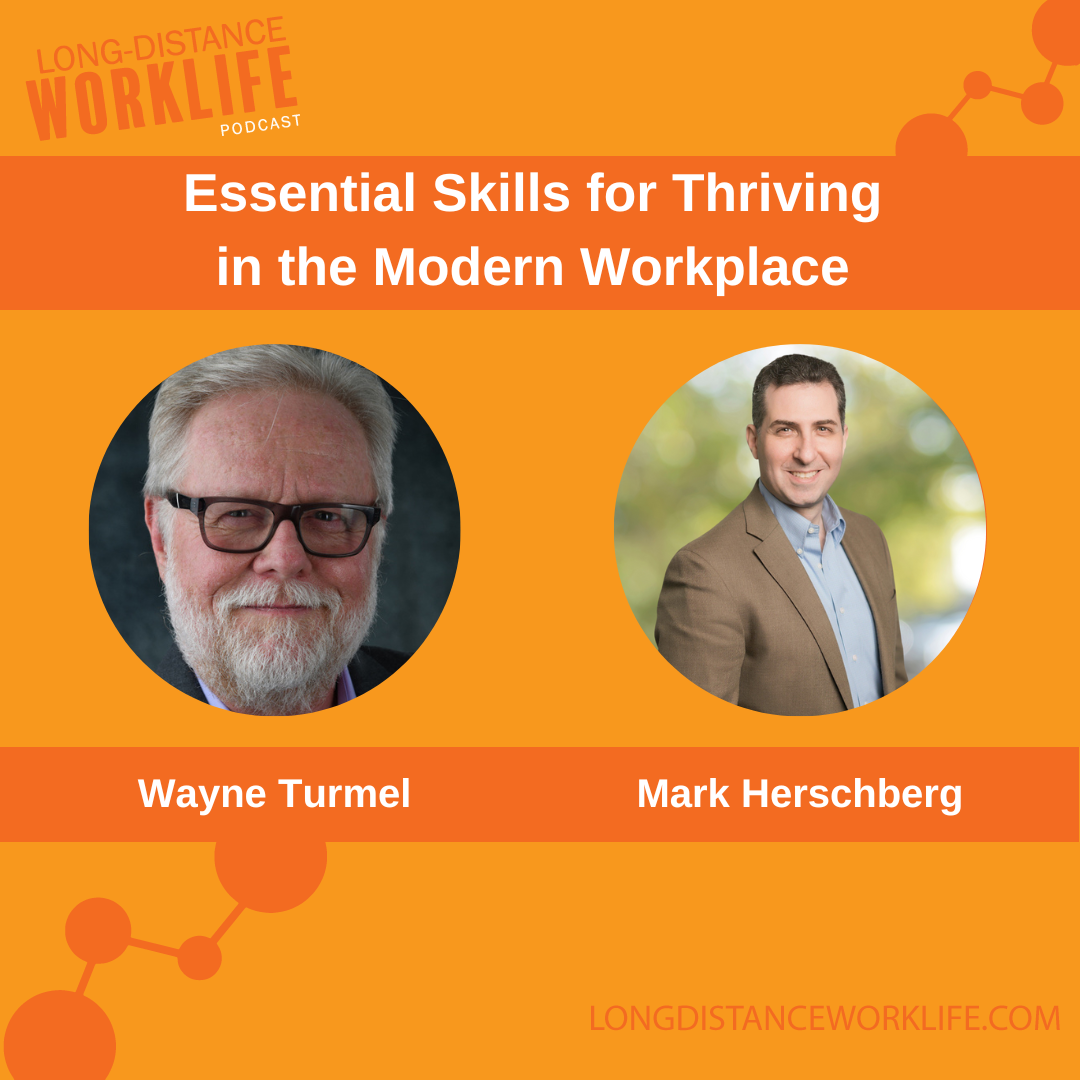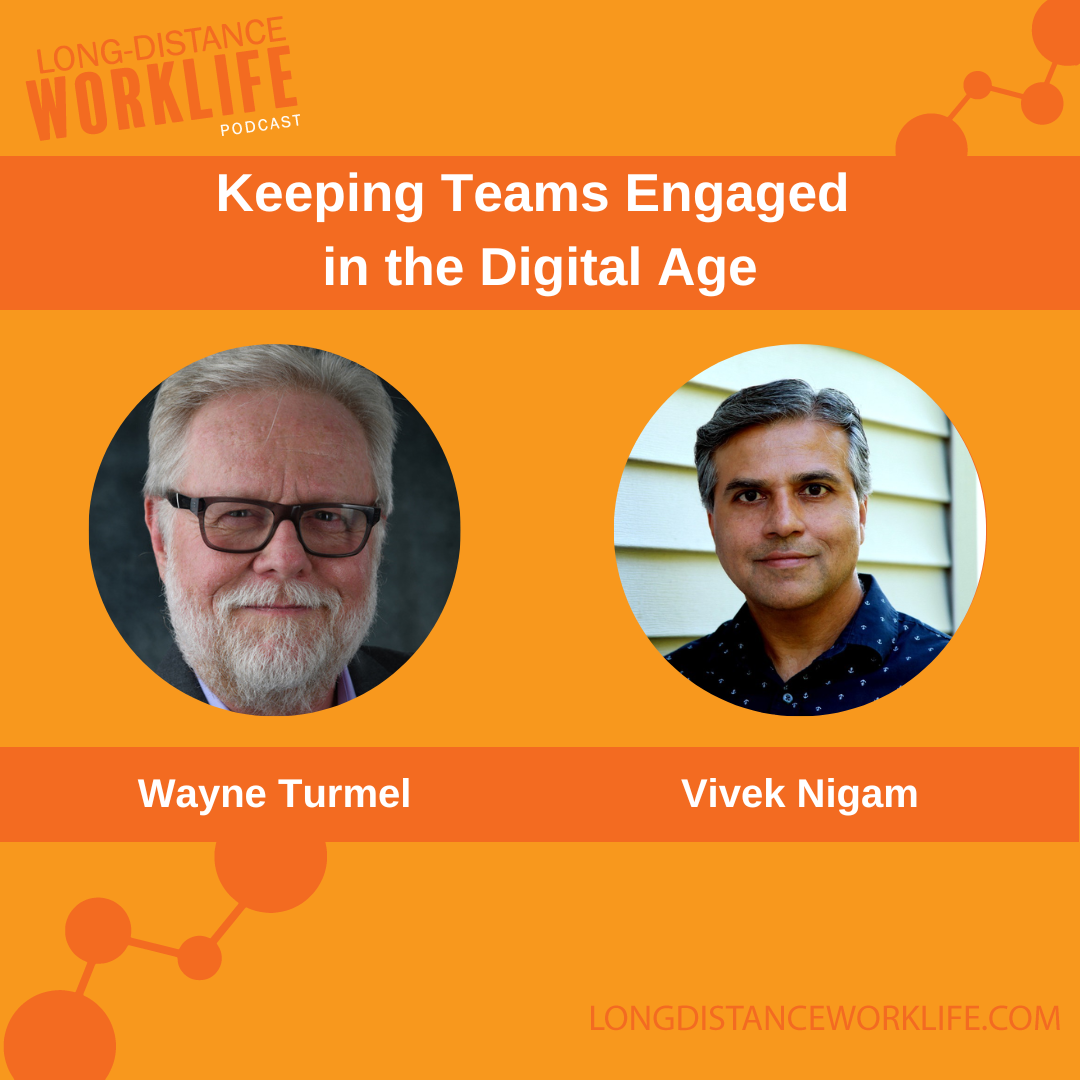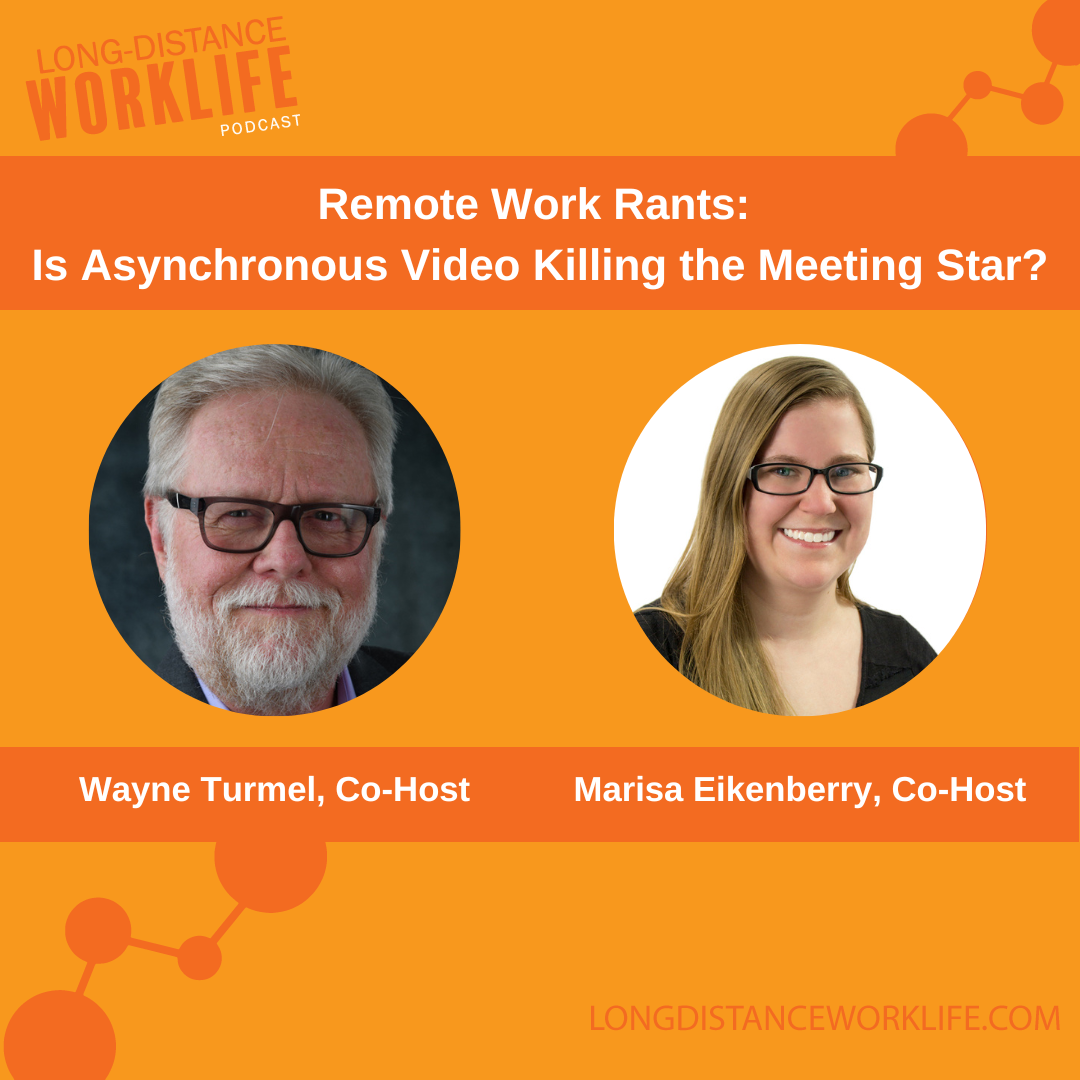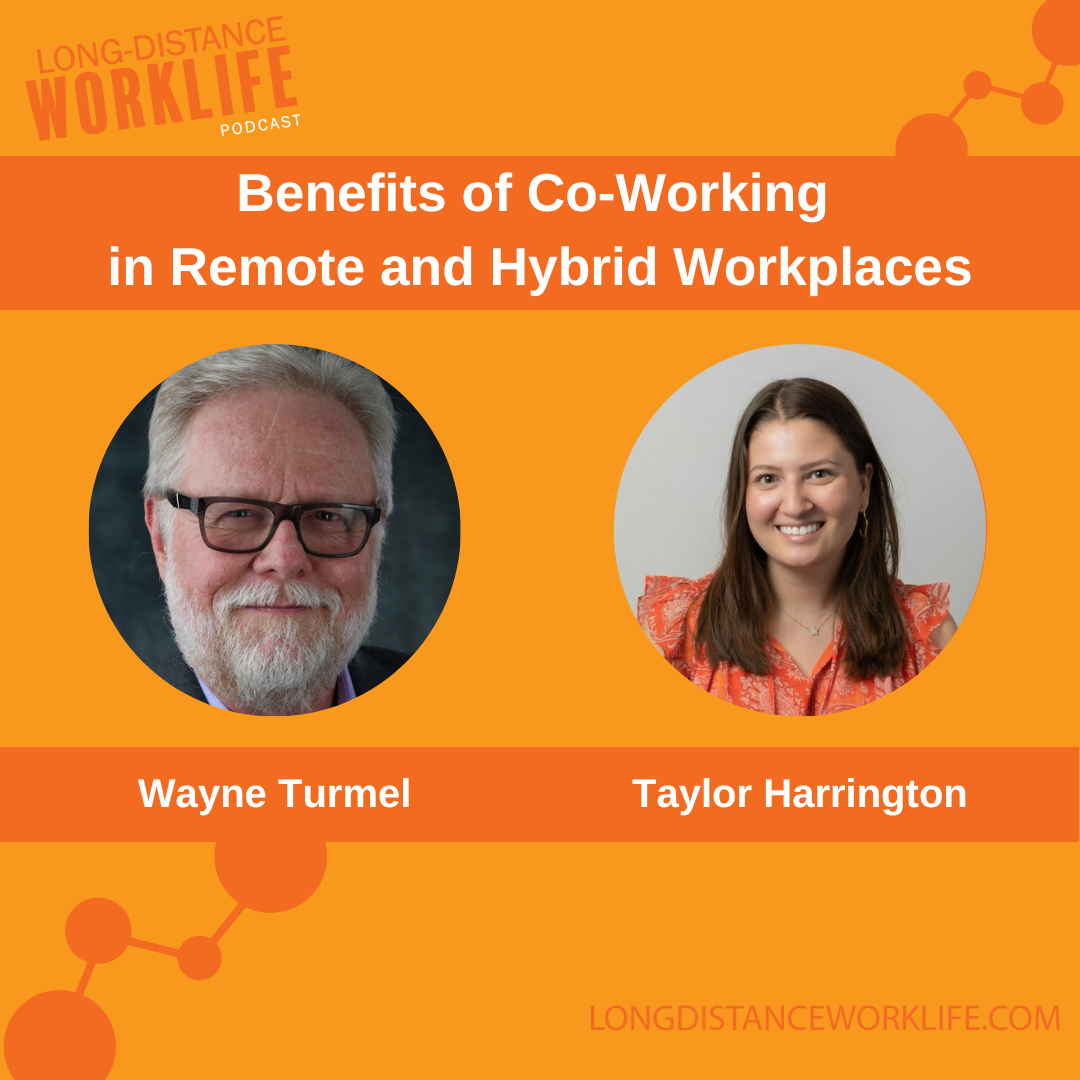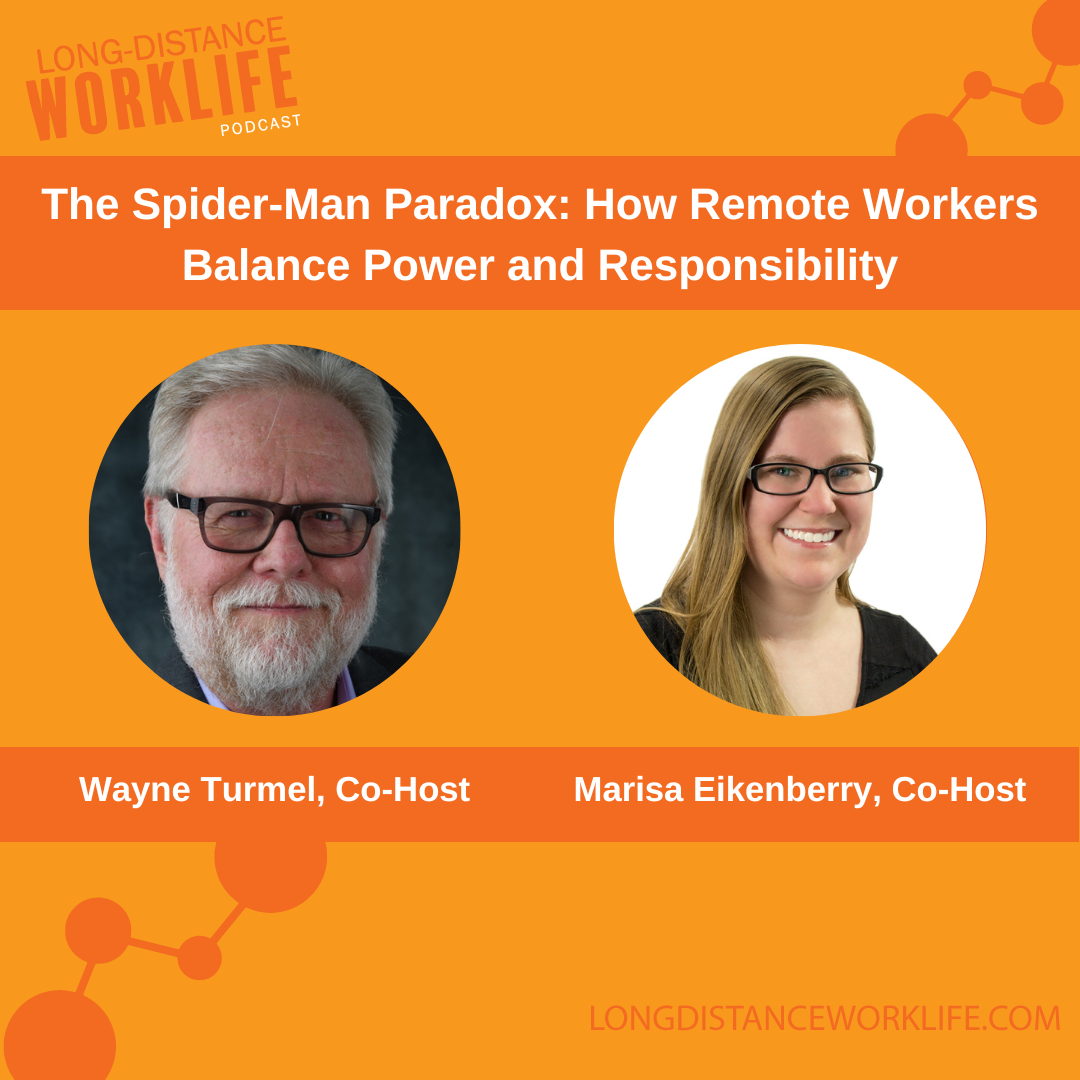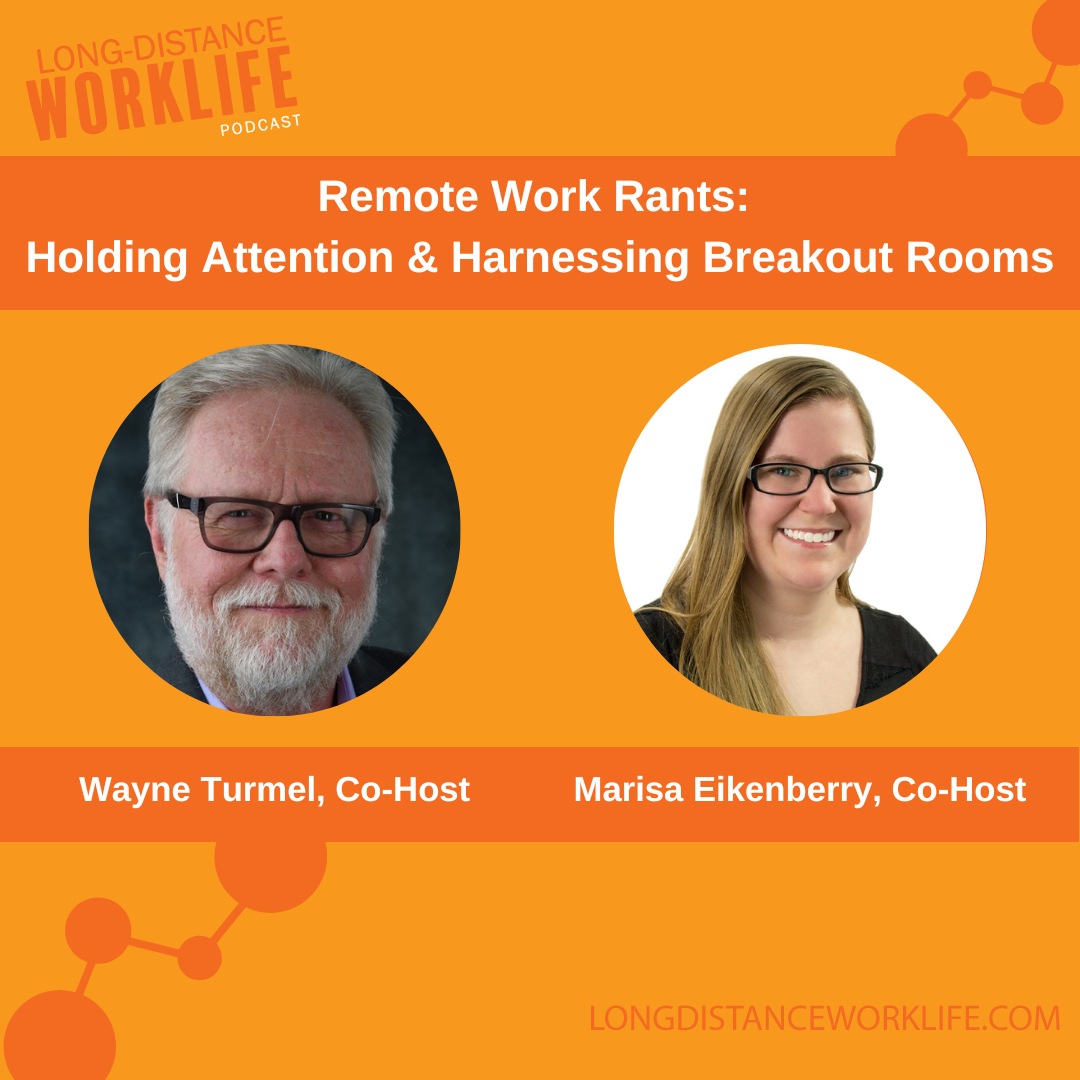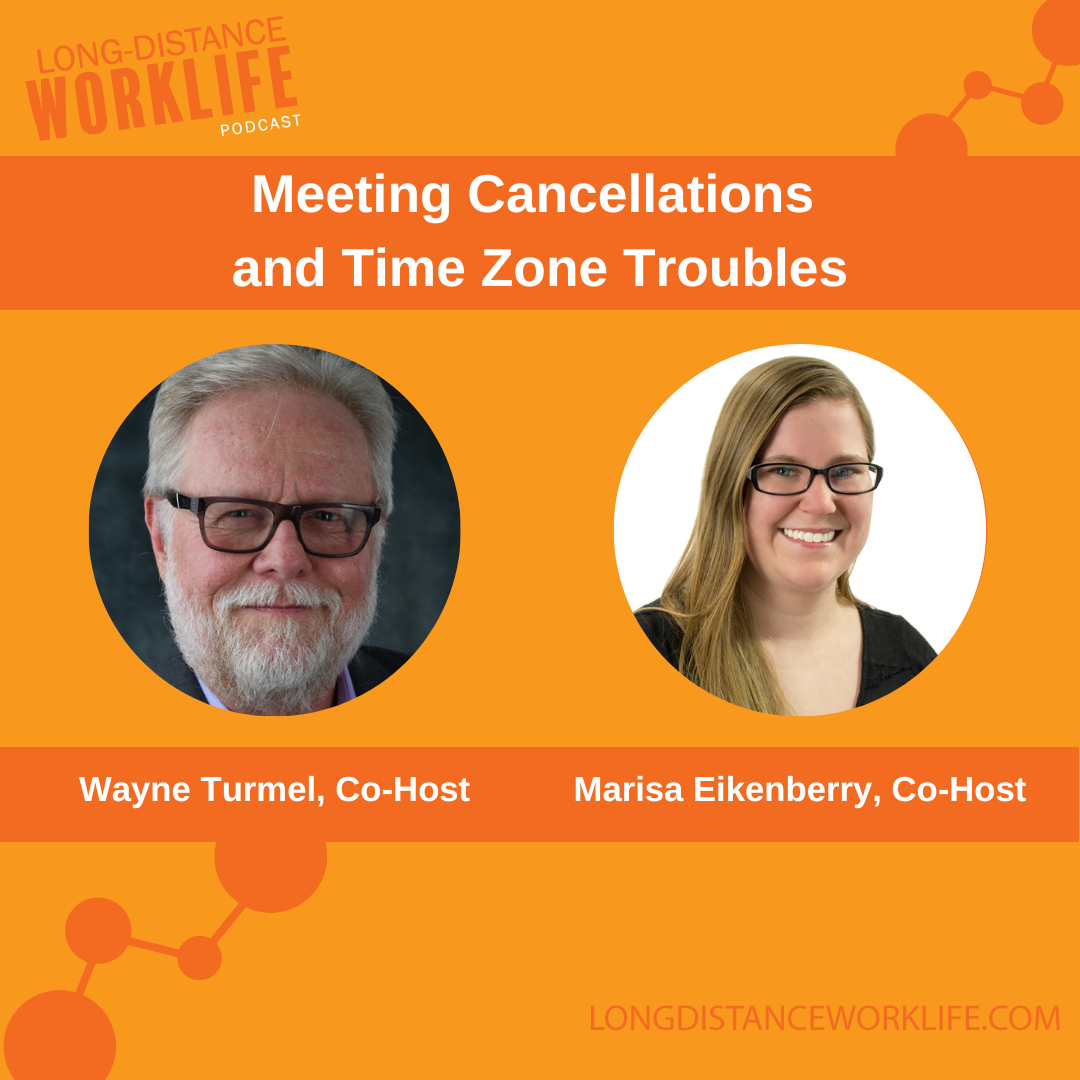Join Marisa Eikenberry and Wayne Turmel as they navigate the lively world of remote onboarding. In this episode they reveal some clever strategies for creating a welcoming remote culture and ensuring new team members feel connected from the start. They dive into practical tips like engaging webcam chats, clear task delegation, and the importance of a user-friendly employee handbook, all spiced up with their trademark humor and expertise.
Key Takeaways
1. Remote onboarding is a critical business problem, as remote workers are statistically more likely to leave if they don't feel a sense of belonging.
2. Onboarding should include webcam conversations with team members to build rapport and connections.
3. Remote employees should be given meaningful tasks and responsibilities from the start to demonstrate their value and contribute to the team.
4. Online employee handbooks and resources should be searchable and logically organized to help new employees navigate company-specific terminology and processes.
00;00;08;02 - 00;00;18;29
Marisa Eikenberry
Welcome back to the Long-Distance Work Life, where we help you lead, work and thrive in remote and hybrid teams. I'm Marisa Eikenberry, a fellow remote worker. And joining me is my co-host and remote work expert Wayne Turmel. Hi.
00;00;19;01 - 00;00;23;25
Wayne Turmel
Hi. That's me. And also a remote worker, as it turns out.
00;00;23;28 - 00;00;37;27
Marisa Eikenberry
That is also true. It's what part of what makes you an expert? So today we are talking about more pet peeves. And first of all, thank you for to so many of you who have been sending us these, we've had so much fun doing them over the last several months.
00;00;38;00 - 00;00;42;09
Wayne Turmel
And I love listening to people whine. That makes me so happy.
00;00;42;12 - 00;00;49;03
Marisa Eikenberry
And the funny part is some of our listeners have said they enjoy hearing you rant about things. So it's a perfect match, right?
00;00;49;05 - 00;00;54;04
Wayne Turmel
It's a good it's a good thing, right? Tell me what you want me to rant about, Brady.
00;00;54;07 - 00;01;13;15
Marisa Eikenberry
Well, today we're going to rant about onboarding and specifically about remote onboarding. So I heard from Katrina on Facebook about onboarding as a fully remote worker into an existing, fully remote team is rough. She did it before COVID, before it was fashionable, and it took 4 to 6 weeks before she felt like she didn't just take up space.
00;01;13;18 - 00;01;37;27
Marisa Eikenberry
She's also had two peers and one supervisor who were all onboarded during COVID. They had a tough time with it and all have since left. And three direct reports, onboarded as a mostly remote experience. But they had complicated processes for getting access to technology and things of that nature. So far, all three direct reports are still here. But as a team, we have to and do work very, very hard to build cohesion and rapport.
00;01;38;00 - 00;01;51;21
Marisa Eikenberry
We actually had somebody else, Rachel, also on Facebook, who had said that onboarding new team members was very tricky for them and it was hard to form new and genuine connections. So there are people that are having issues onboarding remotely so.
00;01;51;23 - 00;02;24;26
Wayne Turmel
Well, they are. And I am going to be that guy again and remind people that this is not just, gee, it's really hard and gosh, I'd like to have gotten it. There is a business cost here if people do not deal within the first five days. A sense of belonging they are statistically more likely to leave. And remote workers, as we have talked about many times on this show, have no barriers to leaving.
00;02;24;28 - 00;02;29;18
Marisa Eikenberry
Right. Yeah, they can start the next day in a completely different job. They just have.
00;02;29;20 - 00;02;30;09
Wayne Turmel
Literally.
00;02;30;09 - 00;02;31;20
Marisa Eikenberry
The only thing that.
00;02;31;22 - 00;03;00;29
Wayne Turmel
Literally the only thing they need to do is get a new password. Yeah. So this is a business problem. It's not just a gosh, wouldn't it be nice to feel more connected to my people problem? It's a legit business problem. And I think the experience I mean, if it takes 40 days to become onboarded and be onboarded, I'm going to guess they mean doing the productive work for which you were hired.
00;03;01;02 - 00;03;04;17
Marisa Eikenberry
Yeah. Feeling like they belong there. They're not here.
00;03;04;19 - 00;03;10;26
Wayne Turmel
And probably two parts, right? Feeling like they belong and actually doing the work that you were hired to do.
00;03;11;04 - 00;03;11;26
Marisa Eikenberry
Right?
00;03;11;28 - 00;03;31;28
Wayne Turmel
Right. That you're not just doing busy work, that you're not just I mean, one of the things that makes me crazy about traditional onboarding and this is true of in-person as well, is why do we spend the first three days that we are hired filling out paperwork?
00;03;32;03 - 00;03;32;29
Marisa Eikenberry
That's fair.
00;03;33;01 - 00;03;45;04
Wayne Turmel
Right. I have to fill out the paperwork so that by the end of the week, hopefully I have my computer and my logging access and all of that stuff. Why isn't that waiting for me? Day one.
00;03;45;07 - 00;03;48;12
Marisa Eikenberry
Yeah. Or even potentially filled out before then, if you're able.
00;03;48;13 - 00;04;25;26
Wayne Turmel
Well, this is what I'm saying is, you know, I know that I start work Monday. How about I get you the paperwork before then? Yeah. And I know that there are issues. If I'm filling out paperwork, I'm technically working and I should be paid, and there's stuff, but come on. Yeah. The fact that we spend so much of the onboarding process and when we're in the office and we're dealing with people and we're sitting in the cube farm and we're kind of kibitzing with people and meeting people and putting faces to names, it's not entirely wasted time.
00;04;25;28 - 00;04;30;00
Wayne Turmel
Right. But then how do you do that?
00;04;30;02 - 00;04;30;12
Marisa Eikenberry
Yeah.
00;04;30;12 - 00;04;52;16
Wayne Turmel
So how do you replicate that experience when you aren't in the office? Right. And I think that is it's an important question. I think it depends on where you are relative to the office. Right. If you can go in for a couple of days, your first couple of days, I think that is an optimum experience.
00;04;52;20 - 00;04;53;26
Marisa Eikenberry
Absolutely.
00;04;53;29 - 00;04;56;20
Wayne Turmel
If you are in Guam.
00;04;56;22 - 00;04;57;25
Marisa Eikenberry
You're not going be able to do that.
00;04;57;28 - 00;05;20;23
Wayne Turmel
You're not going to be able to do that in a way that makes sense. So how do you do it? Now, we have and if you have heard us talk about this, forgive me, dear listener, but this is a best practice that we do that I think is really, really critical. When somebody joins our organization, their first assignment, this is an assignment.
00;05;20;24 - 00;05;43;27
Wayne Turmel
This is stuff they are expected to do. Day 1 to 3 is to set up a half hour webcam conversation with every member of the team, whether they're going to work with that person all the time or not. Right. They may very rarely work with Lisa in payables or Angie behind the scenes, but a half hour webcam conversation.
00;05;43;29 - 00;05;46;20
Wayne Turmel
And it starts with what's your job? What do you do here?
00;05;46;20 - 00;05;47;10
Marisa Eikenberry
Yeah.
00;05;47;13 - 00;05;55;01
Wayne Turmel
Right. But it turns into where you go to school and do you have kids and what's on that shelf behind you and you know.
00;05;55;01 - 00;06;08;03
Marisa Eikenberry
It to not be mostly work. I mean, yeah, you're going to talk a little bit about that, but it's really meant to be. I'm trying to get to know you as a person. I'm trying to find commonalities so that way we can build rapport.
00;06;08;05 - 00;06;27;15
Wayne Turmel
And these conversations should happen spontaneously if you are in the office with people. Now, to be fair, they honestly don't, right? A lot of us are introverts or we don't want to bother somebody and we're not going to schedule time with somebody at the next desk to say, Give me a half hour and let me pick your brain.
00;06;27;15 - 00;06;55;28
Wayne Turmel
Right? Right. But that's a best practice because it doesn't matter where those people are. You're not just hanging out in the lunchroom with people in the office. Right. So that is a very and it needs to happen right away, like the first couple of days. Right. First of all, what else are you doing anyway? Yeah. You haven't really been trained to do anything yet, but make that useful time.
00;06;56;00 - 00;07;24;22
Wayne Turmel
The other thing that people report with onboarding remotely is there's a lot of time. The minute I meet with my manager, your manager does their best to have one on ones and give them lots of time and stuff, but they're not always available. They are doing other things and helping other employees and whatever. And so the amount of wasted time.
00;07;24;24 - 00;07;25;18
Marisa Eikenberry
Right?
00;07;25;21 - 00;07;39;12
Wayne Turmel
Those first few days is really frustrating to people. They want to do work. They don't want to. Well, I had a call with my boss at one and I've got training at three and what do I do in the meantime?
00;07;39;14 - 00;07;59;19
Marisa Eikenberry
So on that same lines, I know that recently we had an episode where we talk a lot about asynchronous video and we talk about that in the context of meetings. But you know, to your point about this whole scheduling time and all that. Would you recommend asynchronous video on board in at least for part of the process?
00;07;59;21 - 00;08;20;15
Wayne Turmel
I think where it makes sense, I think that's absolutely true. And, you know, we a lot of organizations have training, right. E-learning and stuff. It doesn't have to be that formal. So it's great when you can do that, right? When you have all the schmancy e-learning and.
00;08;20;17 - 00;08;22;29
Marisa Eikenberry
And your I.T. department has time to build it for you.
00;08;23;02 - 00;08;45;20
Wayne Turmel
And the department has time to build that for you and all that stuff. I think that short asynchronous messages, you know, just to start the day. Hey, Marisa, today I want you doing this right. And it's not an email. It's just, Hey, how you doing? Hope you had a great night. Listen, today we're going to work on this.
00;08;45;27 - 00;08;59;06
Wayne Turmel
I want you to contact Alice this morning, and I want you to talk to so-and-so this afternoon and talk to them about this function or get them to show you how they do X.
00;08;59;10 - 00;09;00;28
Marisa Eikenberry
That all make sense.
00;09;01;00 - 00;09;12;25
Wayne Turmel
It's informal, it's casual, it's useful. Right? It's. You're still getting some degree of face and voice time with the person. And it's personalized.
00;09;12;27 - 00;09;15;17
Marisa Eikenberry
Right? Yeah. It's way better than just a slack message.
00;09;15;20 - 00;09;52;22
Wayne Turmel
And I think if we think about the way we've traditionally onboarded, it doesn't really work anyway. I mean, think about the way we used to start jobs, especially at big companies. It's your first day and so you go to bootcamp and you and eight other new hires fly to wherever the headquarters is and you're in class all day and then you go out for dinner at night and you do that lather, rinse, repeat, and it's at least four days and sometimes two weeks, and the amount that you remember is zero.
00;09;52;25 - 00;09;59;06
Marisa Eikenberry
Yeah, I was I will admit I've never had that experience. And now I'm very thankful that I have not.
00;09;59;08 - 00;10;31;06
Wayne Turmel
If you are if you join an organization as a new salesperson, especially straight out of school or new in your career, odds are that you have had to go to bootcamp. And the fact of the matter is, the human brain doesn't absorb information that way. Yes, you socialize, right? First of all, you you create a cohort with your fellow learners and those relationships can very often last throughout your time at the company.
00;10;31;11 - 00;10;33;02
Marisa Eikenberry
Right. And those are very important.
00;10;33;04 - 00;10;39;27
Wayne Turmel
There are no atheists in foxholes. And, you know, you bond in times of extreme stress.
00;10;39;27 - 00;10;41;08
Marisa Eikenberry
Right.
00;10;41;10 - 00;11;03;28
Wayne Turmel
But in terms of two weeks of constant training, training, training, here's your handbook. Turn to page eight. You actually retain very little and at least in the old days, you used to get a binder and you could go back and refer to the document in the binder and find, How do I do that? Again, we don't get binders anymore.
00;11;03;28 - 00;11;04;27
Marisa Eikenberry
Okay, So we.
00;11;04;27 - 00;11;06;22
Wayne Turmel
Have that one.
00;11;06;27 - 00;11;20;26
Marisa Eikenberry
Yeah. So I know that, like you said, we don't we don't do the binder thing anymore, but I know that there are some companies that they've created online employee handbooks or user guides or whatever you want to call it.
00;11;20;26 - 00;11;23;20
Wayne Turmel
And they are usually impossible to navigate.
00;11;23;23 - 00;11;24;19
Marisa Eikenberry
Okay.
00;11;24;21 - 00;11;32;14
Wayne Turmel
The information, this is where I, he says, referring to an early conversation that we had. This is where II becomes helpful.
00;11;32;19 - 00;11;33;05
Marisa Eikenberry
That makes sense.
00;11;33;05 - 00;12;06;29
Wayne Turmel
Because at least in a binder, I can lift my finger and start flipping pages to find what I need online. If I don't know exactly what that thing is called, I am scrolling forever. Whereas if the A, I can say, Hey, show me how to do X boom, there it is and you're good. So if you're going to have online onboarding, if you're going to have employee handbooks electronically, they need to be searchable and they need to make some sort of logical sense.
00;12;07;01 - 00;12;14;17
Marisa Eikenberry
And that makes sense. I know that there are some companies they use notion for this. Some of them create a wiki or things like that. So I mean, even.
00;12;14;17 - 00;12;36;23
Wayne Turmel
One can be incredibly, incredibly helpful. But the other thing is it's just this two weeks of whatever and there's this lovely thing that I've talked about for years, but I don't think we've ever talked about on the show, which is the Maryland okay, which is the term. It's a big rabbit hole, literally, because it's stolen from the book Watership Down.
00;12;36;26 - 00;12;44;05
Wayne Turmel
But basically the horror element is how much you can take into your brain before it's full.
00;12;44;07 - 00;12;44;20
Marisa Eikenberry
Right.
00;12;44;26 - 00;13;12;19
Wayne Turmel
And you can't. And you know, if you've ever been to a training class, this is usually about 11:00 on day one. You have absorbed all the stuff you can absorb. And it's not that you don't want to be a good soldier and you don't want to learn it. You just don't get a chance to use it and process it and move it from short term memory to long term memory to make room for more stuff, let alone a week or two weeks of this nonsense.
00;13;12;19 - 00;13;17;27
Marisa Eikenberry
Yeah, you'll remember the first things you learned in the last things you learned and you won't remember a lot of the in between.
00;13;18;00 - 00;13;38;11
Wayne Turmel
Exactly right. And so one of the things that we are learning about onboarding is, yes, some things are best done in the office. Well, if you're going to be in a hybrid environment, be prepared to space in the office. You know, even if you're mostly going to be working from home, suck it up, take a day, two days, do what you need to do.
00;13;38;14 - 00;14;05;21
Wayne Turmel
But a lot of it can be learned in chunks and it can be learned in chunks from different sources. Traditionally at onboarding, Marisa's been here forever. I'm going to bolt the new person to Marisa, and she's going to follow her around like a little duckling and imprint on her. And that's how she's going to learn. And she's going to learn all of Marisa's good habits, and she's going to pick up all of Marisa's bad habits.
00;14;05;24 - 00;14;08;11
Wayne Turmel
And Marisa is not going to get a darn thing done.
00;14;08;13 - 00;14;09;03
Marisa Eikenberry
Right.
00;14;09;05 - 00;14;16;06
Wayne Turmel
While this is going on, but helpful for knowing where the bathroom is and who's responsible for the coffee and, you know.
00;14;16;07 - 00;14;18;01
Marisa Eikenberry
And having a buddy in the office like that.
00;14;18;01 - 00;14;47;06
Wayne Turmel
So having somebody that you're assigned to online virtual team collaboration and onboarding should be the same. But you can pick different people for different functions so that you're not. Marisa isn't the only human in the world that person knows right? Right. Alison's our resident expert, expert on Excel, and Bob has been here a really long time. And you know what?
00;14;47;13 - 00;15;03;24
Wayne Turmel
I want you to take an hour with Bob and just get the history of the company. Look up what you know, What did he know? What does he know about the culture? That seems like a strange thing to assign. It's the kind of thing that we think happens organically in person.
00;15;03;24 - 00;15;04;26
Marisa Eikenberry
And it does not.
00;15;04;29 - 00;15;13;26
Wayne Turmel
But it does not. And if you wait for it to happen organically, you know it's not going to happen as quickly or perhaps as well.
00;15;14;01 - 00;15;39;09
Marisa Eikenberry
So going along the same lines of, you know, there's a point where there's too much information for us to grasp. And, you know, maybe employee handbooks aren't the right thing or user guides or I know for us and I'm sure this is true for many companies, you know, we have acronyms, acronyms and initial isms. And we have these words that nobody uses except for us, like, how do you how do you onboard somebody into that?
00;15;39;09 - 00;15;59;29
Marisa Eikenberry
How do you help them find that? I know that we as a company, we we keep realizing we've had two people who onboarded two years ago now and, you know, they've been with us and everything's great. And every now and then they ask a question that for us we think, Well, duh, it's X, Y, Z. And then we have to remember they don't know this or they never asked.
00;15;59;29 - 00;16;02;18
Marisa Eikenberry
So it never came up again.
00;16;02;21 - 00;16;18;21
Wayne Turmel
I would be a beautiful thing right there on a meeting. And we're all talking about the LDL series and blah, blah, blah, and they can go on and go, what in the name of everything that's holy is the LDL series. Right. And they can get the answer without looking like idiots.
00;16;18;28 - 00;16;19;26
Marisa Eikenberry
Okay, There.
00;16;20;00 - 00;16;49;03
Wayne Turmel
This is this is where now. So some of this is information gap. Right. But the other thing is, are there tasks that they can and should be doing that they can't do their entire job, but they can start to go through their lead list. They can start to compile a list of there are things that they can do so that as soon as possible they are doing some valuable work and adding value to the team.
00;16;49;04 - 00;17;07;25
Marisa Eikenberry
Well, and it sounds like, too, there's there's a responsibility for the people who have been working there for a while to inform the new people about things. And there's a responsibility of the new person. Ask questions, too. Now, granted, I realize if they can't ask what they don't know, but there's also stuff they can't ask.
00;17;08;02 - 00;17;36;16
Wayne Turmel
But there is. It's funny when you talk about company culture and company handbooks and that kind of thing, there's explicit knowledge and there's tacit knowledge. Okay. Explicit knowledge is stuff that's on the page. If you want to know how to do X, go to this website, turn to this page. There is a process for this, right? If I'm working and I have a question, well, everybody knows Alice is the Excel wizard.
00;17;36;21 - 00;17;49;04
Wayne Turmel
Where does it say that we should say, If I have an Excel question, I have to go to Alice because I'm going to Marisa because she's the only person I know. And Marisa is completely useless when it comes to excel.
00;17;49;06 - 00;17;56;03
Marisa Eikenberry
Right? Well, which also means that I need to be really good about saying I'm not the Excel expert. Alice It.
00;17;56;05 - 00;18;21;19
Wayne Turmel
Exactly right. So one of the things that's helpful is if you have people with specific knowledge or skill sets, get them involved early, particularly if they are remote from each other because I might be unwilling to reach out to Marisa with a question. But that's Marisa's job, right? Marisa knows that I am.
00;18;21;21 - 00;18;25;17
Marisa Eikenberry
I am the keeper of the email. You have to talk to me at some point, right?
00;18;25;20 - 00;18;47;22
Wayne Turmel
Two things are going to happen. One is that I feel less resistance to reaching out to Marisa because I know that. And the other thing is Marisa might be a little more proactive about checking in with me, about how I'm doing with that thing, because that's the piece of knowledge that Marisa is responsible for.
00;18;47;24 - 00;18;48;21
Marisa Eikenberry
Right?
00;18;48;23 - 00;19;12;07
Wayne Turmel
Right. And this all sounds very complicated, but it really is critical to getting people on board. I mean, we talk about, well, people need to be comfortable and how well, how do they do that exposure to the people on their team getting to know them socially, developing trust very quickly, doing meaningful work and demonstrating that you can do meaningful work.
00;19;12;07 - 00;19;19;07
Wayne Turmel
Right. Maybe what this person needs is to be invited to a couple of meetings that they are completely unqualified to be in.
00;19;19;11 - 00;19;20;03
Marisa Eikenberry
That's fair.
00;19;20;06 - 00;19;45;09
Wayne Turmel
But they might have an idea, right? Hey, at my old company we did that and they'll hear the acronyms flying around and they'll hear how we work together. So parceling out their day and figuring out when they do actual work, when can other people be involved in this so that we are creating the social networks and the bonds and the relationships?
00;19;45;12 - 00;20;06;19
Wayne Turmel
And then what useless work can we eliminate? Right, Right. So they're not spending five days filling out forms before they even talk to another human being. That will go a long way to making the onboarding process more pleasant, more useful and more consistent with the way we're working.
00;20;06;26 - 00;20;26;04
Marisa Eikenberry
That totally makes sense. And unfortunately, we are out of time. I know that we could probably continue to talk about this for much longer than this, but I want to thank Katrina and Rachel for sending in your suggestion about talking about onboarding, because I think this was a really important conversation, and I'm sure this is not the only time that we're going to talk about onboarding in the future.
00;20;26;06 - 00;20;42;13
Marisa Eikenberry
And thank you so much for listening to the longest work life for Shownotes Transcripts and other resources make sure to visit long distance work like that. Tom If you haven't yet subscribe to the podcast, you won't miss any future episodes while you're there. Be sure to like and review. This helps us know what you love about our show.
00;20;42;15 - 00;20;57;27
Marisa Eikenberry
Feel free to contact us via email or LinkedIn with the links in our show notes and let us know you listen to this episode or suggest a topic for Wayne and I to tackle in a future episode. We'd love to hear from you if you'd like to learn more about remote teams. Order Wayne and Kevin Eisenberg's new book, The Long Distance Team.
00;20;57;29 - 00;21;04;09
Marisa Eikenberry
You can learn more about the book at Long Distance Team Book Tor.com. Thanks for joining us. And as Wayne likes to say, don't let the weasels get too down.
Timestamps
00:00 Intro to Remote Onboarding
01:13 Challenges & Turnover in Onboarding
02:24 Addressing Remote Onboarding
03:11 Traditional vs. Remote Onboarding
04:25 Replicating In-Person Onboarding
05:20 Webcam Conversations Best Practices
06:08 Building Remote Rapport
06:56 Tackling Time Wastage in Onboarding
07:39 Overcoming Onboarding Delays
07:59 Asynchronous Video for Onboarding
08:45 Short Messages for Daily Tasks
09:12 Traditional Methods & Retention
10:31 Building Relationships in Onboarding
11:06 Searchable Online Handbooks
13:38 Hybrid Onboarding Strategies
14:05 Diverse Roles in Onboarding
15:39 Navigating Company Jargon
16:18 Encouraging Questions from New Hires
16:49 Engaging New Hires in Valuable Tasks
17:36 Sharing Explicit and Tacit Knowledge
18:21 Involving Skilled Team Members
19:12 Building Trust and Exposure
19:45 Creating Social Networks
20:06 Streamlining the Onboarding Process
20:26 Closing
Related Episodes
Additional Resources
- Learn more about Wayne Turmel
- Email Wayne Turmel
- Connect with Wayne Turmel on LinkedIn
- Learn more about Marisa Eikenberry
- Email Marisa Eikenberry
- Connect with Marisa Eikenberry on LinkedIn
- Purchase a copy of The Long-Distance Leader
- Purchase a copy of The Long-Distance Teammate
- Purchase a copy of The Long-Distance Team
- The Kevin Eikenberry Group
Order The Long-Distance Team
Remote leadership experts, Kevin Eikenberry and Wayne Turmel, help leaders navigate the new world of remote and hybrid teams to design the culture they desire for their teams and organizations in their new book!


